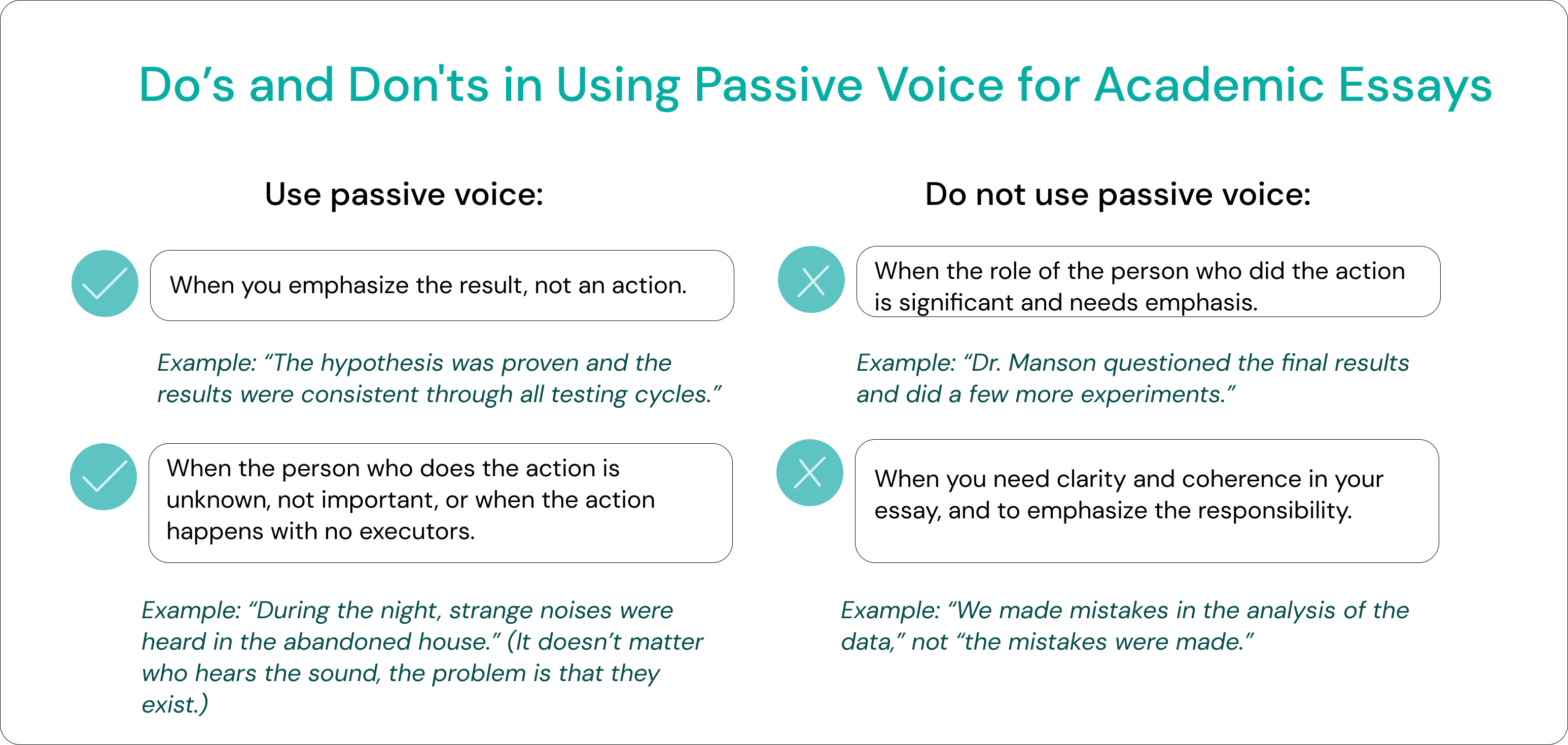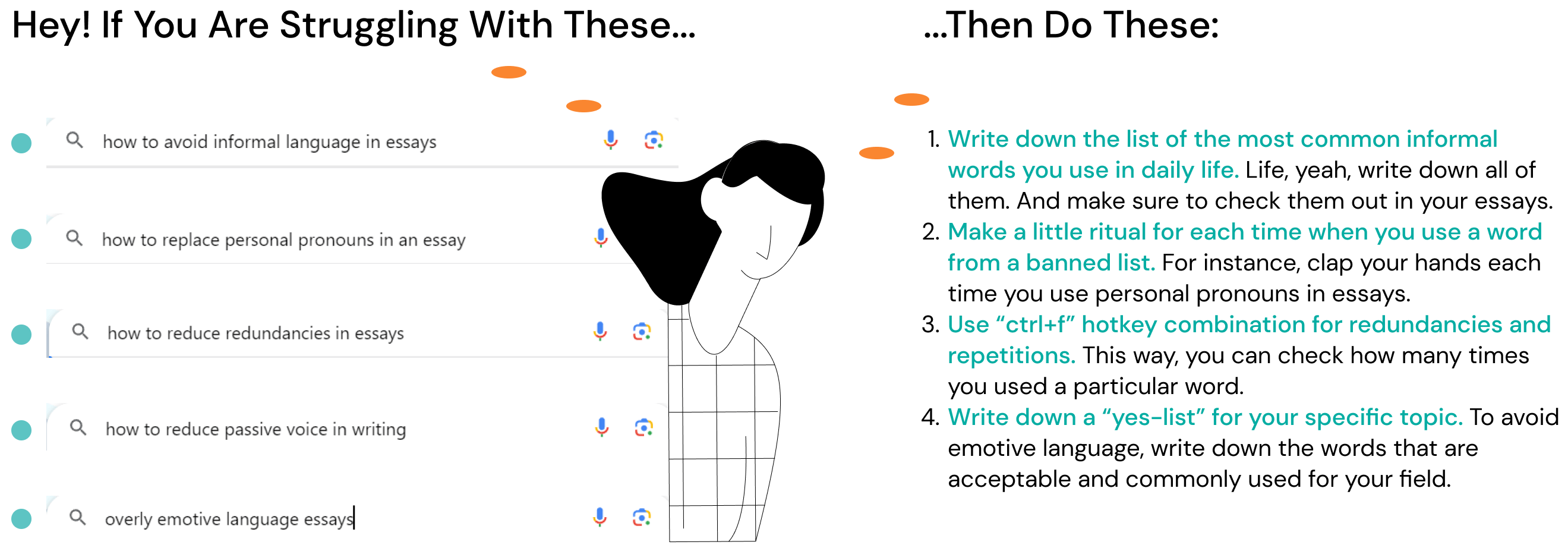As I am writing this article, I can ask how you are doing. I can say that I’m dead on my feet this week and looking forward to Friday. I can use the word “I” as I please; I can use as much emotionally friendly vocabulary and informal words as I need for the article’s purposes. We are in the place where you come to get some inspiration or help from me, and this place is better and more comfy for both of us, right? However, this is not the case for essay writing. That is why I am here to tell you about words not to use in an essay.
The purpose of essay writing is to discuss the topic professionally, take a look at the best law essay tips from experts, and showcase the student’s knowledge and skills. That is why academic writing has more strict vocabulary requirements.
The academic field has some unwritten but commonly known rules about the words to use and to avoid in essays. So, let’s find out which is which, so you don’t face any during the writing process.
Common Essay Writing Mistakes and What to Do About Them
Don’t get me wrong: there are many possible scenarios of why a particular word may be a bad match for the essay’s context. However, I can share a few of the most common word-related mistakes students make in essay writing.
Top 5 most common vocabulary mistakes in academic writing
As we can’t control every word you write, it will be easier to concentrate on particular types of words to not use in an essay. Here they are:
1. Using informal language. For instance, you cannot use words like “cool,” “okay,” “so,” yeah/nope,” “stuff,” “kinda,” “gonna,” “pretty sure,” and others of that kind when writing, even if it comes to the topics for first year English. In general, this rule applies to slang words, contractions (don’t, I’m), and sometimes separable transitive phrasal verbs (“This study will break the complex concepts down).
Some more examples: Huge, sort of/ kind of, because, a bunch of, awesome, thing, tons of, totally, huge, folks, gonna/wanna, but, anyway, a bit.
2. Using personal pronouns. Personal pronouns are at the top of the list of words to not use in an essay. (Unless you write your college application leadership essay, of course.) Why? Because unless it is a personal statement or opinion essay, you are supposed to adhere to a neutral tone of voice and analytical perspective. Moreover, referring to groups of people with “we/they” has a bit of informality in it, which is better to avoid in essays.
Bad example: “In this paper, I will show that the theory is flawed. I closely studied the author’s arguments. They say that only nurses must be more engaged in interpersonal communication with patients. I think they have got the perspective wrong.”
Improved example: “While the evaluated theory has its benefits, it also exhibits severe flaws. In particular, the author’s arguments regarding nurses’ exclusive communication with patients are debatable. This essay will argue for a more diversified approach to healthcare communication.”
For example, if you don’t know how to not use the word “you” in an essay, think of just one synonym. What word are you trying to replace with the pronoun “you”? Afterward, google the synonyms for that noun, and you will have plenty of words to use instead of “you” throughout your essay.
3. Fluffy filler phrases and redundancies. The fact of the matter is that in order to write an essay, students basically must use words to some extent, as it was mentioned before. The previous sentence looks hilarious, right? Well, a sentence with only one filler phrase is as fluffy as one with five of them. That is why you need to try avoiding them at all costs.
Some more examples: “It’s important to note that,” “It goes without saying that,” “At the present moment,” “In the process of,” “Due to the fact that.”
4. Extensive passive voice. Passive voice phrases are not the type of words to not use in an essay at all. Sometimes, there is no other way to say something except with passive voice construction. However, try rephrasing them to the active voice when possible. Word choice adds much to persuasive writing in such cases.
Bad example: “ It has been observed that minerals are formed through complex geological processes.”
Improved example: When we talk about the formation of minerals, there is no living subject who does the action. Minerals are just formed by themselves, so we can use the passive voice here. However, we can answer the question of “who observes the minerals.” Hence, it’s better to say, “Scientists observed that minerals are formed through complex geological processes.”

5. Overuse of emotive language or, on the contrary, overly technical complex writing style. Even if some fact or event you describe is incredible, magnificent, and tremendous, it’s better to use more moderate words in your essay. For instance, you can change these with words like “admirable,” “notable,” or “outstanding.”
Bad example: “Cunning marketing campaigns usually try their best to shamelessly manipulate consumers and keep their wallets wide open.”
Improved example: “Marketing campaigns sometimes may be manipulative, leading to ill-considered buying experiences and customer regrets.”
How to improve essay vocabulary: easy and fast tips
Okay, so you know what words to not use in an essay. You know its main types and common essay mistakes. But there are so many diverse tips to improve writing out there and so many points to work on. How can you do all that and yet control each of your words? I’ve got you. Here are some easy-to-do tips specifically for each mistake type:

Words that Weaken Your Argument
Some categories of simple words not to use in an essay do not belong to fluff words, mistakes, and redundancies. They are appropriate in some contexts but harmful in others. In general, weak words are those words that make your argument sound more subjective or insecure. To deliver a strong vocabulary, you must avoid anything that is “writing jewelry” rather than essential content. Let me show you what I mean by that.
Examples of weak vs strong words
- “Everyone” is a weak word. Broad terms make your writing groundless. Instead, specify who you are referring to.
- Such words as “maybe,” “perhaps,” and “potentially” DEFINITELY do not belong to a strong vocabulary. Skip them altogether to improve writing an essay.
- Unless you are positive about the absence of counterexamples, do not use “always/never.” These are not weak words, but they do weaken your arguments for the critique.
- “Absolutely,” “basically,” “certainly,” “clearly,” “absolutely,” and all similar words are mainly acceptable in academic writing when they serve as linking words. Otherwise, they hold some informality and a more distinct subjectivity. For example, if you write, “The research demonstrates absolutely clear results,” it raises some questions. Are there any other scenarios when the research shows absolutely unclear results? To improve your essay writing, avoid using evaluation words or use them as a link between ideas.
| HANDPICKED RELATED CONTENT: Words to Describe a Student Academically Transition Words for Paragraphs in Essays |
Top three tips for stronger writing you should use
Okay, then, how can you work on your word choice and persuasive writing? Strong vocabulary vs weak words is a matter of practice, of course, so here are some tips for your vocab exercises and stronger academic writing:
- Cut out all redundancies. Go through your text while editing and evaluate each sentence. Are there any weak words that do not contribute to the content? If the answer is yes, rearrange your word choice so there is nothing more to cut.
- Your enemy is carelessness. Most commonly, students make vocabulary mistakes just because they don’t know where to look, and they don’t even bother searching for what may be wrong. Hence, if you take five minutes to go through the words, it will tremendously improve writing style and word choice in your essays.
- Always think about the purpose. There are thousands of beautiful, effective, and strong words in the English language. However, only some of them fit the academic writing style, so, unfortunately, no pirate lads or galleys with good oars are allowed in your essays, no matter how appealing they are.
Overused Words in Academic Writing: Verb Edition
Finally, this is my last say on what words to not use in an essay. Some words are totally fine regarding strong vocabulary. They don’t belong to informal or emotive language and are not redundant. Yet, they are… too common. It will not be a mistake to use such vocabulary, but there is always some room for growth, right? So, try to replace these verbs with proposed alternatives, where possible, to strengthen your essay:
| Common words | More fancy/original counterpart |
| Explain | Elaborate |
| Present | Unveil |
| Develop | Evolve |
| Conclude | Deduce |
| Revise | Amend |
| Compare | Equate |
| Examine | Scrutinize |
| Express | Convey |
| Explain | Elucidate |
| Form | Constitute |
| Extract | Derive |
| Obtain | Acquire |
| Define | Ascertain |
| Initiate | Commence |
| Visualize | Envision |
Better Alternatives for Common Words: Noun Edition
Oops, it was not my last say on the topic; I have a bonus for you. Here are some more words you may need to make your academic writing persuasive and well-composed:
| Common words | More unique counterpart |
| Perspective, aspect | Facet |
| Point | Notion |
| Part | Component |
| Result | Outcome |
| Reason | Rationale |
| Unfair difference | Disparity |
| Interaction | Interplay |
| Beginning | Onset |
| Formation | Genesis |
| Change | Shift |
| Growth | Advancement |
| Thought | Cognition |
| Examination | Scrutiny |
| Discovery | Revelation |
| Situation | Scenario, occurrence |
Please note that more sophisticated words do not usually mean more benefits for the content, so be wise about choosing your vocabulary.
FAQ. Words and Mistakes to Avoid and Improvements to Make in Your Essays
1. What words should I avoid in an essay? You must avoid informal language (abbreviations, contractions, slang, phrasal verbs), emotive language, everything that highlights subjectivity (unless it’s a personal opinion essay), passive constructions, and filler phrases.
2. What are common mistakes in essay writing? The two most common vocabulary mistakes in essay writing are using words carelessly and not editing vocabulary. While we write, we concentrate on the meaning, citations, and formatting. It’s really easy to miss some vocabulary inconsistencies or inappropriately styled phrases. Hence, check your text and work with every aspect of writing individually.
3. How can I improve my essay vocabulary? Remember that word choices significantly impact an essay. They change the way the reader perceives your text, what tone of voice it conveys, and how persuasive the arguments are. Hence, make sure to do some vocab exercises from time to time, edit your texts, and read our blog regularly, and you will be fine. If you feel that you need some practical assistance, you are always welcome to consult our free writing examples, like a, or any other that is relevant to your task, and see how our experts have explained their ideas and feel that professional vibe.





